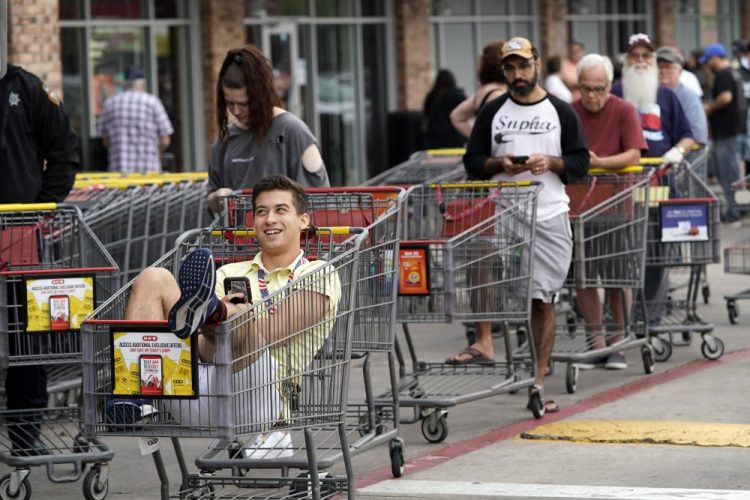The coronavirus has pitched grocers onto the front lines of an accelerating public health crisis, forcing many chains to reduce hours and put buying caps on such high-demand foods as ground beef and frozen pizzas. Now some chains and independent grocers are restricting the number of shoppers in their stores or offering seniors-only hours.
Industry experts and trade groups say it’s only a matter of time before supermarkets take even more drastic measures, as they look for ways to curb the spread of the highly contagious virus among customers and employees. Many are looking abroad for guidance.
In Italy, Lidl is capping stores to 20 shoppers at a time, who are limited to 10-minute slots. In the United Kingdom, some supermarkets are opening an hour early, at 8 a.m., to accommodate elderly shoppers, who are at higher risk if they contract the virus.
And in China, at the height of its outbreak, stores checked customers’ temperatures at the door, and required them to stand at least three feet apart from others in line.
U.S. chains like Kroger, Walmart and Dollar General have already begun shortening store hours, to allow employees enough time to restock and disinfect at the end of the day. Costco said in an email to members on Tuesday that it would begin restricting the number of shoppers in stores in the interest of social distancing, but did not provide details on how it would do so. Target announced it would reserve an hour on Wednesday mornings for elderly shoppers and those with underlying health conditions.
“We’re all having conversations, but we want to make sure we don’t implement these (measures) too early,” said Doug Baker, who heads crisis management for the Food Marketing Institute, a trade group for food retailers and wholesalers. “We’ll probably have to start limiting the number of people, but how do we do that so they’re not all just waiting in the parking lot?”
Smaller grocers in some part of the country have begun experimenting with ways to curb the flow of shoppers. In Youngsville, Louisiana, NuNu’s Fresh Market has a 15-person limit from 6:30 to 7:30 a.m. – a move aimed at protecting more vulnerable groups such as the elderly and those with weakened immune systems. Managers are also limiting essentials like bread, rice, eggs and baby formula to two per customer, and have asked shoppers to limit the number of people they bring along on shopping trips.
“We started seeing the fear in our customers’ eyes, wondering how they could stay safe,” said Blaine Broussard, the company’s president. “We don’t have a ton of people coming in at 6:30 as it is, so we said, why not set aside this time for the people who need it?”
On Tuesday, the first morning of the new arrangement, Broussard stood at the door and greeted customers as they walked in. A couple of times, he had to ask shoppers to wait until others were done, but over all the approach moved smoothly. At its most crowded, the 18,000-square-foot store had 15 shoppers.
Imposing shopper limits at larger stores, grocery managers say, could prove more challenging. Retailers like Dollar General and Stop & Shop, a regional chain based in Quincy, Massachusetts, are starting to offer seniors-only hours for those age 60 and up, without liming the actual number of people who can be in stores. Stores could soon move to even more segmented schedules – with specific blocks for families with children, say, or those with weakened immunity, in coming days, said Brittain Ladd, a consultant to Kroger and other retailers.
“This virus doesn’t treat everybody the same, so grocery retailers can’t either,” he said.
The discussions on how to separate shoppes are part of a broader reckoning for supermarket operators being faced with unprecedented levels of demand and looming uncertainty, as entire cities and states order residents to shelter in place. Many are also worried about labor shortages, as tasks increase and workers fall ill. Walmart and Kroger – the nation’s two largest grocers – are rapidly recruiting store workers and truck drivers to meet demand, while Amazon has said it will hire 100,000 warehouse and delivery workers.
“The message now is: If you’ve been laid off from your job at a restaurant or another retailer, we’re hiring,” said Phil Lempert, a California-based supermarket industry analyst. “There is a big need for people to stock shelves, to clean, to do absolutely everything.”
The shifts are also accelerating grocers’ efforts to automate their fulfillment centers and make online ordering more efficient by investing in drones and autonomous delivery vehicles, industry consultants said. Online delivery has typically accounted for just 2 to 3 percent of a grocer’s business, said Ladd, “but if this thing keeps going the way it is, we could be looking at a situation where 50 to 60 percent of grocery retailers’ business comes from online.”
At Giant Food, demand for delivery services – which include a new “contact-less option” – has tripled in recent days, as customers look for ways to limit exposure, interim president Ira Kress said.
Retailers have often used their stores to fulfill online orders. But as demand skyrockets – both in stores and online – many are finding that there’s little inventory left for delivery orders. Some have started talking about quickly opening “dark stores” – locations where inventory is picked for online orders, but closed to the public, Ladd said.
“Grocery retailers are saying, ‘How quickly can we open dark stores and automate as much as this as possible, before the virus gets worse?’,” he said. “This is unlike anything the industry has ever seen.”
Copy the Story LinkComments are not available on this story.
Send questions/comments to the editors.


